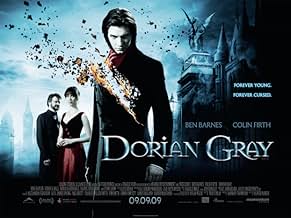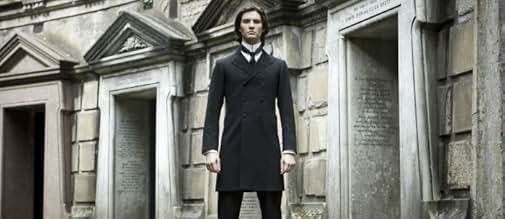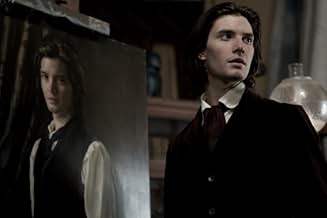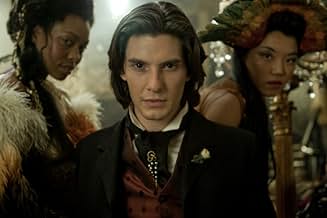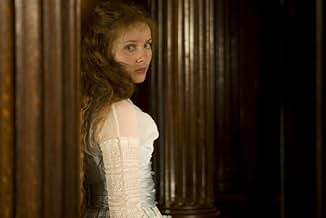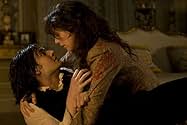AVALIAÇÃO DA IMDb
6,2/10
70 mil
SUA AVALIAÇÃO
Um jovem corrupto, de alguma forma, mantém sua beleza juvenil para sempre, mas uma pintura especial revela sua feiúra interior a todos.Um jovem corrupto, de alguma forma, mantém sua beleza juvenil para sempre, mas uma pintura especial revela sua feiúra interior a todos.Um jovem corrupto, de alguma forma, mantém sua beleza juvenil para sempre, mas uma pintura especial revela sua feiúra interior a todos.
- Prêmios
- 1 indicação no total
Jeff Lipman
- Lord Kelso
- (as Jeffrey Lipman Snr)
- Direção
- Roteiristas
- Elenco e equipe completos
- Produção, bilheteria e muito mais no IMDbPro
Avaliações em destaque
Based on a book by Oscar Wilde i thought this will be interesting film and i was not disappointed. I never read the book so i don't know how close the book is to the film but i must say the writer has done a great job updating this, with a story that really grip you.
The directer has done great job making it very dark but not too dark you can't see thing. Making feel like you are in back street of London in 1800's. The casting was top notch with newcomer Ben Barnes and an really outstanding performance by Colin Firth. Was really surprised to see Ben Chaplin from the comedy show "Game On". He is not bad drama actor too.
You can really connect with characters in this film which it make it really interesting film to watch and an story that alway make you think. Must see.
The directer has done great job making it very dark but not too dark you can't see thing. Making feel like you are in back street of London in 1800's. The casting was top notch with newcomer Ben Barnes and an really outstanding performance by Colin Firth. Was really surprised to see Ben Chaplin from the comedy show "Game On". He is not bad drama actor too.
You can really connect with characters in this film which it make it really interesting film to watch and an story that alway make you think. Must see.
'Dorian Gray', directed by Oliver Parker, is definitely a more graphic adaptation of the spirit of the book written by Oscar Wilde. Throughout, I wondered how Wilde would react to the film, were he still with us. On one hand, I believe he would have appreciated the touch of horror; I certainly felt it in his writing. He was quoted from another of his books (Lady Windermere's Fan) "In this world there are only two tragedies. One is not getting what one wants, and the other is getting it." In this movie, the latter was certainly true for poor Dorian.
On the other hand, the book 'Picture of Dorian Gray' seemed fairly minimalist in affect (as was Barnes' interpretation of the character) so, would Mr. Wilde be a smidge put off by all the melodrama and overt sexual content? Who knows? He used a lot of symbolism and subtle innuendo in his writing, but the politics of the time could account for some of what he didn't literally spell out, I suppose. After all, he was imprisoned for his lifestyle and beliefs, for a time.
Wilde lived a deep and complicated life. His personality and character were revealed through his writing and oh, what I would have given to be on his list of friends. "A good friend will stab you in the front." -- Oscar Wilde
Alas, the book, in this case, pleased my pitiful imagination more than the movie. While the acting was superb, I had a difficult time reconciling myself with what I felt was an over-reach on the tenor of this great story. You know, the old 'less is more' adage.
My disclaimer to the literary elite: I am simply an appreciator of art, not a professional, so take my opinion with a grain of whatever you prefer.
"I don't say we all ought to misbehave, but we all ought to look as if we could." -- Oscar Wilde
On the other hand, the book 'Picture of Dorian Gray' seemed fairly minimalist in affect (as was Barnes' interpretation of the character) so, would Mr. Wilde be a smidge put off by all the melodrama and overt sexual content? Who knows? He used a lot of symbolism and subtle innuendo in his writing, but the politics of the time could account for some of what he didn't literally spell out, I suppose. After all, he was imprisoned for his lifestyle and beliefs, for a time.
Wilde lived a deep and complicated life. His personality and character were revealed through his writing and oh, what I would have given to be on his list of friends. "A good friend will stab you in the front." -- Oscar Wilde
Alas, the book, in this case, pleased my pitiful imagination more than the movie. While the acting was superb, I had a difficult time reconciling myself with what I felt was an over-reach on the tenor of this great story. You know, the old 'less is more' adage.
My disclaimer to the literary elite: I am simply an appreciator of art, not a professional, so take my opinion with a grain of whatever you prefer.
"I don't say we all ought to misbehave, but we all ought to look as if we could." -- Oscar Wilde
Very good adaption with a nicely chosen cast with some fresh and familiar faces. Thought provoking about pleasure vs happiness like the themes of the namesake book it's based on. The main character's looks is important to the film and the actor delivers his change from innocence to experience to corruption pretty well.
A bit too long in the last arc. Not entirely sure about the final scene or it's contribution to the film-so the man responsible for corrupting Dorian revenges on him for bedding his daughter. Does he do any self reflection at all for his own suggestions and encouragement that led Dorian down this path? It seems to me like the film is missing this angle of development. This is an example of a missing layer of thematic complexity that prevents me from giving a higher score.
I don't recall the book that much but there might be a few innovations in this film such as the same sex scenes (since the author Oscar Wilde I believe was homosexual) and the motivation of Dorian to change and to compel him to his final act.
A bit too long in the last arc. Not entirely sure about the final scene or it's contribution to the film-so the man responsible for corrupting Dorian revenges on him for bedding his daughter. Does he do any self reflection at all for his own suggestions and encouragement that led Dorian down this path? It seems to me like the film is missing this angle of development. This is an example of a missing layer of thematic complexity that prevents me from giving a higher score.
I don't recall the book that much but there might be a few innovations in this film such as the same sex scenes (since the author Oscar Wilde I believe was homosexual) and the motivation of Dorian to change and to compel him to his final act.
The Picture of Dorian Gray, as penned by the Irish wit Oscar Wilde (1854 - 1900), is a tale of high-brow debauchery and limitless pleasures of body and soul and the corruption, by one Lord Henry Wotton, of the young, handsome and soon to be narcissistic 19th century rock 'n roll hell-raiser Dorian Gray.
Ealing Studios have translated Wilde's controversial novel into a celluloid den of iniquity that somehow comes across as rather shallow. Like the characters seen here too; it seems that as a work of symbolic gesture of how the upper classes conduct their sordid lifestyle of hypocrisy, deceit and lust it lacks any deep and thoughtful intrigue that any good 19th century Gothic horror story should be.
To fully understand the ethics of a Victorian London that Oscar Wilde has so wonderfully reflected with his novel here, we see, too, with this latest interpretation using, as Wilde may have done, the picture purely as a metaphorical means. Yes, we see the selling of souls here and the lamb to the slaughter and the hedonistic teachings of Lord Wotton, but toward the end, the whole sordid affair becomes predictable.
Penned with an undercurrent of realism and too fantasy of the love of sin. It's a dark, dirty, dingy setting of a self-indulgent Victorian London that we are lead to believe is prim and proper on the surface but lurking just below this weak, temperate society lies pure greed, greed for experience, experience that will transcend the mind, body and soul to the wondrous dealings of what life has to offer. For, as always, a price, a price both Oscar Wilde and Dorian Gray would pay the highest sacrifice.
It is with a taint of sorrow that this latest performance too has paid a price too high, sensationalism over content, ironies aside, the film seems too concerned to show the sordid details of this lifestyle and its inhabitants'. It lingers on too far in the bedrooms of London and strays too far from the mental anguish that may have been. We see the trouble mind of our young (looking) man but we see not enough of his fears, regrets, sorrows and repentance, which are cast aside and squandered. Welcome to the 21st century Mr. Wilde.
By the time the chimes of time are echoing in the distance we have Dorian fading into the far reaches of the eternal abyss of the afterlife. With all the time in the world we are still wanting more to feed our palates, it's all to aesthetically pleasing, but at the same time oh so unrewarding, a taster we are given but the full flavour we are, regrettably, spared.
This too may have its target audience and in so having picked its target out it may have trouble standing the test of time, due to its lack of wit, lack of diversity and a lack of daring and commitment of its original source. It is a sad loss that such a literary work of historical meaning and wealth should have been robbed of its qualities.
Ealing Studios have translated Wilde's controversial novel into a celluloid den of iniquity that somehow comes across as rather shallow. Like the characters seen here too; it seems that as a work of symbolic gesture of how the upper classes conduct their sordid lifestyle of hypocrisy, deceit and lust it lacks any deep and thoughtful intrigue that any good 19th century Gothic horror story should be.
To fully understand the ethics of a Victorian London that Oscar Wilde has so wonderfully reflected with his novel here, we see, too, with this latest interpretation using, as Wilde may have done, the picture purely as a metaphorical means. Yes, we see the selling of souls here and the lamb to the slaughter and the hedonistic teachings of Lord Wotton, but toward the end, the whole sordid affair becomes predictable.
Penned with an undercurrent of realism and too fantasy of the love of sin. It's a dark, dirty, dingy setting of a self-indulgent Victorian London that we are lead to believe is prim and proper on the surface but lurking just below this weak, temperate society lies pure greed, greed for experience, experience that will transcend the mind, body and soul to the wondrous dealings of what life has to offer. For, as always, a price, a price both Oscar Wilde and Dorian Gray would pay the highest sacrifice.
It is with a taint of sorrow that this latest performance too has paid a price too high, sensationalism over content, ironies aside, the film seems too concerned to show the sordid details of this lifestyle and its inhabitants'. It lingers on too far in the bedrooms of London and strays too far from the mental anguish that may have been. We see the trouble mind of our young (looking) man but we see not enough of his fears, regrets, sorrows and repentance, which are cast aside and squandered. Welcome to the 21st century Mr. Wilde.
By the time the chimes of time are echoing in the distance we have Dorian fading into the far reaches of the eternal abyss of the afterlife. With all the time in the world we are still wanting more to feed our palates, it's all to aesthetically pleasing, but at the same time oh so unrewarding, a taster we are given but the full flavour we are, regrettably, spared.
This too may have its target audience and in so having picked its target out it may have trouble standing the test of time, due to its lack of wit, lack of diversity and a lack of daring and commitment of its original source. It is a sad loss that such a literary work of historical meaning and wealth should have been robbed of its qualities.
I liked the 1945 film very much, but have always looked forward to a newer film that could dare to delve into the excesses that Wilde could only hint at in his novel, and even the 1945 film had to change a minor few details to make it acceptable for that time.
Now, this version - while it does show more, it has far less. There is none of the wit and wisdom of the characters in the novel or the delicate beauty of Dorian, and the ending is completely changed for no good reason.
I still have to wait for the definitive film version that can (literally) flesh out the characters while still keeping the novel intact. Too much to ask?
Now, this version - while it does show more, it has far less. There is none of the wit and wisdom of the characters in the novel or the delicate beauty of Dorian, and the ending is completely changed for no good reason.
I still have to wait for the definitive film version that can (literally) flesh out the characters while still keeping the novel intact. Too much to ask?
Você sabia?
- CuriosidadesThe original Dorian Gray has blond curly hair and blue eyes.
- Erros de gravaçãoWhen Dorian is fighting Jim in the train station tunnel, the sleepers and spikes are visible. The spikes seen were not in use in 1890 when the novel was written, nor the era when the film is set.
- Citações
Lord Henry Wotton: There's no shame in pleasure. Man just wants to be happy. But society wants him to be good. And when he's good, he's rarely happy. But when he's happy, he's always good.
- Cenas durante ou pós-créditosAt the start of the closing credits, they fade in and out, alternating with images of the Portrait peeking through, as though it is trying to assert itself.
- Versões alternativasDuring post-production, the film was tailored for a '15' certificate in the UK. According to the BBFC, the filmmaker cuts were as follows:
- A scene in which a tea party is inter-cut with shots showing Dorian's sadomasochistic excesses was toned down to remove or reduce the more explicit moments (explicit sight of a fingernail being pulled off, explicit sight of a chest being cut with a razor in a sexual context, explicit sight of blood being sucked from a woman's breasts and sight of a restrained man being beaten).
- Additionally, a murder scene was toned down to remove the sense of dwelling on the infliction of pain and injury (reduction in the number of stabbings, removal of a blood spurt from man's neck, reduction in sight of victim choking on his blood).
- ConexõesFeatured in Lost in Adaptation: The Picture of Dorian Gray 2009 (2020)
Principais escolhas
Faça login para avaliar e ver a lista de recomendações personalizadas
Detalhes
- Data de lançamento
- País de origem
- Central de atendimento oficial
- Idioma
- Também conhecido como
- El retrato de Dorian Gray
- Locações de filme
- Empresas de produção
- Consulte mais créditos da empresa na IMDbPro
Bilheteria
- Faturamento bruto mundial
- US$ 22.873.653
- Tempo de duração
- 1 h 52 min(112 min)
- Cor
- Mixagem de som
- Proporção
- 1.85 : 1
Contribua para esta página
Sugerir uma alteração ou adicionar conteúdo ausente




